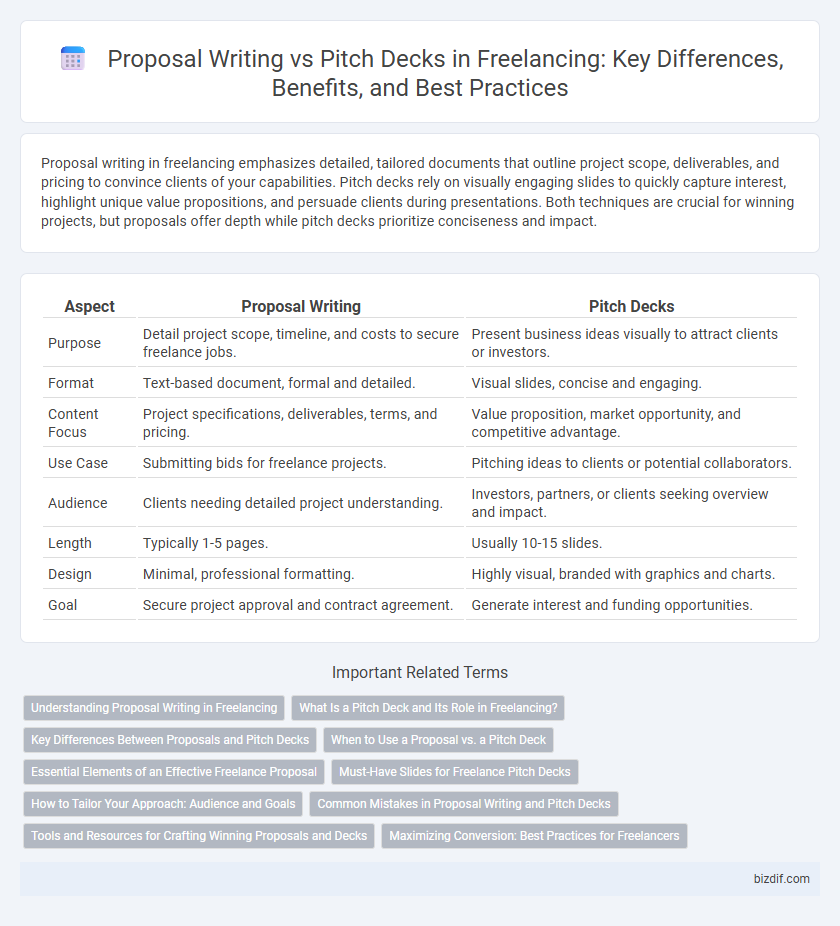Proposal writing in freelancing emphasizes detailed, tailored documents that outline project scope, deliverables, and pricing to convince clients of your capabilities. Pitch decks rely on visually engaging slides to quickly capture interest, highlight unique value propositions, and persuade clients during presentations. Both techniques are crucial for winning projects, but proposals offer depth while pitch decks prioritize conciseness and impact.
Table of Comparison
| Aspect | Proposal Writing | Pitch Decks |
|---|---|---|
| Purpose | Detail project scope, timeline, and costs to secure freelance jobs. | Present business ideas visually to attract clients or investors. |
| Format | Text-based document, formal and detailed. | Visual slides, concise and engaging. |
| Content Focus | Project specifications, deliverables, terms, and pricing. | Value proposition, market opportunity, and competitive advantage. |
| Use Case | Submitting bids for freelance projects. | Pitching ideas to clients or potential collaborators. |
| Audience | Clients needing detailed project understanding. | Investors, partners, or clients seeking overview and impact. |
| Length | Typically 1-5 pages. | Usually 10-15 slides. |
| Design | Minimal, professional formatting. | Highly visual, branded with graphics and charts. |
| Goal | Secure project approval and contract agreement. | Generate interest and funding opportunities. |
Understanding Proposal Writing in Freelancing
Proposal writing in freelancing involves creating a detailed, personalized document that outlines the project scope, deliverables, timelines, and budget, tailored to meet the client's specific needs. Unlike pitch decks, which serve as visual presentations to engage prospective clients quickly, proposals are comprehensive and formal, providing a structured plan to secure freelance contracts. Mastering proposal writing enhances freelancers' ability to communicate professionalism, project understanding, and value, significantly increasing the chances of winning projects.
What Is a Pitch Deck and Its Role in Freelancing?
A pitch deck is a concise presentation used by freelancers to showcase their skills, project ideas, and value proposition to potential clients or investors. It typically includes visuals and key information about the freelancer's expertise, past work, and project goals, helping to create a compelling narrative and build trust. In freelancing, a pitch deck serves as a strategic tool to differentiate oneself from competitors and secure project opportunities efficiently.
Key Differences Between Proposals and Pitch Decks
Proposal writing involves detailed documentation outlining project scope, deliverables, timelines, and costs tailored to client requirements, emphasizing clarity and formal structure. Pitch decks focus on visually engaging presentations designed to capture interest quickly, highlight unique value propositions, market potential, and competitive advantages. Proposals prioritize comprehensive information and contractual commitments, while pitch decks target persuasion and initial client engagement.
When to Use a Proposal vs. a Pitch Deck
Use a proposal for detailed project outlines, budgets, and timelines when clients require formal documentation to make decisions. A pitch deck is ideal for initial presentations or meetings to capture interest through visuals and concise information. Choosing between a proposal and pitch deck depends on the stage of client engagement and the complexity of the project.
Essential Elements of an Effective Freelance Proposal
An effective freelance proposal should clearly outline the project scope, deliverables, timeline, and budget, ensuring alignment with the client's needs. Unlike pitch decks that focus on visual storytelling and broad business ideas, proposals demand precise, actionable details and professional tone to build trust. Highlighting relevant experience, client benefits, and a customized approach significantly enhances proposal success rates in freelancing.
Must-Have Slides for Freelance Pitch Decks
Freelance pitch decks must include slides highlighting project scope, timeline, and budget to clearly communicate value and expectations. Including client testimonials and portfolio samples boosts credibility and trust with potential clients. A compelling freelance pitch deck also features a problem-solving approach and unique skills, differentiating the freelancer from competitors more effectively than a standard proposal.
How to Tailor Your Approach: Audience and Goals
Effective freelancing proposal writing demands a concise, targeted approach that highlights specific skills and project understanding, while pitch decks should visually showcase broader strategies and potential outcomes tailored for decision-makers. Understanding the audience's priorities--whether clients seeking immediate solutions or investors interested in long-term value--guides the choice of tone, structure, and content depth. Aligning proposals or pitch decks with the client's goals enhances engagement and increases the likelihood of winning projects or securing funding.
Common Mistakes in Proposal Writing and Pitch Decks
Common mistakes in proposal writing include vague objectives, lack of tailored solutions, and insufficient focus on client needs, which often result in low response rates. Pitch decks frequently suffer from overcrowded slides, unclear value propositions, and failure to highlight key metrics or competitive advantages, reducing investor or client engagement. Both tools require concise, targeted messaging and clear calls to action to maximize success in securing freelance projects or funding.
Tools and Resources for Crafting Winning Proposals and Decks
Freelancers benefit from using specialized tools like Proposify and PandaDoc to create professional, customizable proposals that enhance client engagement and streamline approval processes. Pitch decks gain impact through platforms such as Canva and Beautiful.ai, which offer templates and design features tailored to visually communicate project goals and value propositions. Integrating analytics tools like DocSend provides real-time insights into client interaction, optimizing follow-up strategies for both proposals and pitch decks.
Maximizing Conversion: Best Practices for Freelancers
Effective proposal writing and creating compelling pitch decks are essential techniques for freelancers aiming to maximize client conversion rates. Proposals should be tailored to clearly address the client's specific needs, highlight relevant experience, and include measurable outcomes to build trust. Pitch decks complement proposals by visually showcasing project value through concise storytelling, impactful data, and clear calls to action, increasing engagement and decision-making confidence.
proposal writing vs pitch decks Infographic

 bizdif.com
bizdif.com